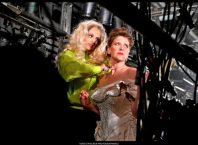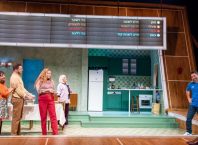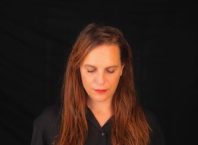Every look, every conversation is a translation, and every translation an interpretation. Hanoch Levin’s “Krum” had just appeared at the Cameri Theatre, in a TR Warszawa production directed by Krzysztof Warlikowski. I sat with Krum – Polish actor and translator Jacek Poniedziałek, on the roof of a Bauhaus building in the center of Tel Aviv. There were two of us at the table that night, surrounded by ghosts. He spoke of Warlikowski, Levin, and Krum, telling his own story through the stories of others.
Poniedziałek, whose translations of plays have been published in the theatre magazine “Dialog”, met Warlikowski twenty years ago when they were both students at the National Academy of Theatre in Krakow. “We started to work together and to love each other,” says Poniedziałek, “sharing the same passion for theater.” Describing a relationship that has not lost its intensity, although for the past two years it has been solely a working partnership, he says: “My point of view is quite often different from his… We talk all the time – about our dreams, fears, and fantasies…our projections of the plays.”
Seeing a Polish version of Hanoch Levin in Israel is dramatically different from anywhere else in the world, both in terms of the audience’s familiarity with Levin’s work, and the complicated relationship between Jews and Poland. Warlikowski’s Krum opens with several actors walking onto the stage while the house lights are on and members of the audience are still finding their seats, establishing an almost casual atmosphere. The lights dim. A huge close-up of a man’s anguished face appears on a screen, Krum mourning his mother’s death. Anyone familiar with Levin’s work knows that we are hearing the end of the play. But the fun is just beginning: Krum’s “dead” mother gets up from her seat in the first row to face the audience, playing out her scene with Krum who stands on the stage behind her, while another scene plays out simultaneously as spectacularly miserable Tugati asks the neighbors to play him some sad music so that he may experience the release of tears.
Poniedziałek tells me that changing the order and staging scenes simultaneously is one of Warlikowski’s “favorite ways of doing things.” His production of “Hamlet” at Beit Zvi in 1999 began with a sequence of several scenes performed at once with the entire cast onstage. As Poniedziałek explains, “Everyone knows Hamlet…Shakespeare’s introduction is not so necessary.” Rather than delete text, Warlikowski engages the audience by playing with the staging in a way that thwarts expectations. This style of directing resembles Warlikowski’s thought processes as described by Poniedziałek: “Chaotic – the way he talks. He’s pulling lots of threads in the same moment in one simple monologue. He sometimes abandons one context and jumps to another one. [there are] many layers in his mind, [he is] constantly thinking.”
Warlikowski first heard of Levin’s plays while in Israel and brought Poniedziałek an English translation. “I fell in love with the play,” he recalls, “it was clear, strong, funny, poignant, so real – all the qualities we need.” Of the process of translation he says, “It’s my work, but with lots of fights. Krzysztof is a person who fights.” Of Levin, Poniedziałek says, “He was writing so Polish!” Creating a contemporary colloquial translation out of “the language of my childhood, the playground, my mother…a Krakovian, very local language, the language of the street, the neighborhood,” Poniedziałek says, “the actors loved it. There is a saying in Polish: the language suits your mouth and tongue.”
Levin’s writing feels very Polish to Poniedziałek who takes note of the “image of the Polish mother – strong, powerful, maybe sometimes rigid and cruel, sometimes nervous and hysterical.” Drawing parallels between his own life, Levin’s life and the character of Krum, Poniedziałek says, “My father also died when I was a boy. His life was with his mother, who maybe not intimidated him, but…my mother once said, when I told her that I want to be an actor – we are shit and you are going to be the same, so don’t think that you are going to be something else. I could imagine that his [Levin’s] mother might say something similar…not having self-confidence, hopelessness for your children that has its source in a hard life, in poverty.”
Krum, who returns home after years abroad having accomplished and learned nothing, is “very selfish, very lost” according to Poniedziałek, who is anything but. He brings an ease and charm to his portrayal of Krum, enhanced by the cinematic intimacy of the audience’s first encounter with his grief. Moving effortlessly from his slick seduction of Truda to his awkward lust for the unattainable Cica, he establishes himself with the audience as a familiar face from the neighborhood, as if he is not an actor playing a role, but just one of the guys. The affinity between acting and directing style works to enhance this rapport as the barrier between stage and audience is non-existent. The actors not only address speeches to the audience, but actually talk to them, offering criticism, advice and cookies as casually as one would to a neighbor. Warlikowski “loves to set scenes in front of the audience,” says Poniedziałek, “It’s a kind of confession, a conversation in front of the audience.”
This dialogue, the exchange of ideas and feelings, is at the heart of the creative impulse in Warlikowski’s work. Poniedziałek describes him as “very greedy for knowledge, wants to know and understand…in our years of travel spending the summers in Tuscany reading constantly, eating fruits in bed with five open books and surrounded by remains of fruits – apples, pears, tangerines and cigarettes.” When I comment that unlike the selfish Krum, he seems to think and talk more about Warlikowski than himself, Poniedziałek readily concurs, “Because he is for me much more important than myself. I do theater because of him.”
“What is the difference between Krzysztof and other directors?” he says, “why do I claim to be so fulfilled and happy – the most important thing is freedom. We are creating the piece as much as he does. Not ‘I am an instrument’ – he wants people, not actors, people with their knowledge, pain, their past, their childhoods, love affairs and broken souls.” Explaining that unlike in Western theatres where a play will run for a certain time and then disappear, their plays are revived time and again, each time undergoing a creative process that introduces changes to be “attractive…to let the audience be more interested in what we do, to laugh.” Describing Warlikowski as “very witty, very much an intellectual, he wants people to think,” Poniedziałek adds, “Sometimes people don’t want to think very hard. If they can have fun, think, and take something with them in their souls – then we win.”
Image credit: Elizur Reuveni slideshow from “Krum” and reception at The Cameri Theatre






[…] Ayelet Dekel Saturday February 13, 2010 The fascinating and provocative Krzysztof Warlikowski returns to Israel in March, along with Leszek Bzdyl and Malgorzata Szczęśniak to conduct master […]
Comments are closed.